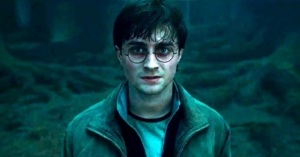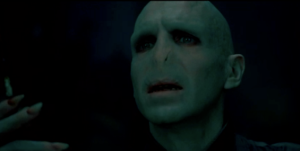Well Bat-boys and Bat-girls, it's finally here. After years of internet speculation, months of binging on promotional material, and more than a few movie tickets bought as a shameless excuse to watch the new trailers, The Dark Knight Rises is here. Christopher Nolan's genre redefining take on the Batman mythos glides into theatres aloft on the praise of audiences and critics alike, but faces the infamous foe that is the finale. So, have Nolan and company stuck the landing, or is the burden of expectation too great to bear? Is The Dark Knight Rises the "Return of the King" or a super disaster of Spider-Man 3 proportions?
The answer is… it's "Jedi". "Rises"is to The Dark Knight saga what Return of the Jedi was to "Star Wars." Wait, wait! Douse the torches and sheath your pitchforks; there are no fuzzy teddy bears or toy tie-ins to be found here, the comparison is meant as a compliment. As many of us had hoped, Bruce Wayne's journey as the caped crusader Batman comes to a definitive, satisfying end, synthesizing the character study that was Batman Begins with the greater thematic aspirations of The Dark Knight into a package that feels whole and complete. Some will find a few niggling questions remain unanswered and criticize the door being left ever so slightly ajar for someone else to pick up the franchise mantle, but it's clear that Nolan but it's clear that Nolan has stretched this comic book adaptation/myth making exercise to its absolute limit.
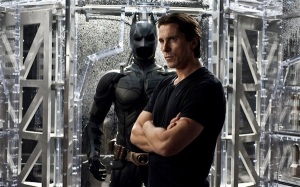
But just like "Jedi" however,the payments made to satisfying the grander narrative are at the expense of the final instalment itself. The huge shift in scope and ambition between parts I and II created a gulf for the trilogy as a whole that "Rises" spends most of its first act filling in. There's a lot of catch up to play when returning to Gotham eight years after Batman shouldered the blame for Harvey Dent's crimes at the end of The Dark Knight, and everyone's out of their element. As Commissioner Gordon (Gary Oldman) struggles to maintain a lie that cleaned up Gotham's streets, Bruce Wayne (Christian Bale) retreats further into solitude in his rebuilt Xanadu of Wayne Manor, having retired from nights of jumping off of rooftops to nurse a broken heart and a lack of purpose.
With great speed, a bevy of new players enter to shake up the peace. There's Miranda Tate (Marion Cotillar), an alluring CEO looking to save the world by getting into bed with Wayne industries, John Blake (Joseph Gordon-Levitt), a rookie cop who understands Bruce better than anyone, and Selina Kyle (Anne Hathaway), a jewel thief looking for a fresh start with a new identity. But the real catalyst for Batman's return is a new threat, the hulking beast Bane (Tom Hardy), who rasps and wheezes like Vader through an analgesic mask, and has designs for Gotham nothing short of total annihilation.
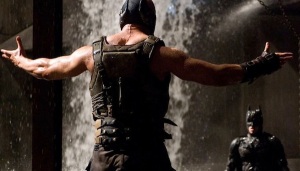
An exhilarating and beautiful opening plane hijacking (as in, one plane lassoing another midair) launches things spectacularly, but early signs of turbulence come about from the half a dozen plot lines frantically racing towards their required destinations. The instances of contrivance and convenience that detracted from The Dark Knight pale in comparison to the happenstance on display here, and numerous scenes feel like nothing more than setup without the memorable quips and sardonic humour the first two scripts had at beck and call.
With "Rises," Nolan has completed the transition from superhero movie to all out epic, one describing a modern day apocalypse of dizzying magnitude. People talking about the film's awards potential could point to its "and the kitchen sink" approach to weaving in every contemporary boogeyman Oscar voters like to reward, from domestic terrorism and Wall st., to civil uprising and weapon proliferation. It doesn't meditate on these ideas too throughly, but keeps their presence a constant as the heroes and villains scramble toward a powerful finale, amping up the sense of dread and despair as Bruce Wayne faces his most agonizing trials yet.
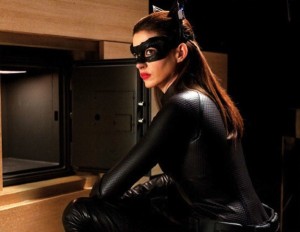
But that's where the film finds its most focussed and satisfying through line, in closing out Bruce Wayne's story by exploring his dependence on his secret identity. It's fitting that the film comes out the same week as the remake of Hara-Kiri: Death of a Samurai, because that's how Bruce functions without the cape and cowl, as a warrior looking for a good death in a world that doesn't want him. With doting butler Alfred (Michael Caine) begging him to hang up the costume for good, Bruce's choice to fight evil physically instead of economically and socially comes into question. Through the endless plot turns, character moments and set pieces, one question comes to centre the film and the franchise as a whole: can Bruce Wayne overcome his inner demons and return to a world he gave up on, or is he destined to go down fighting as the Batman?
And it's a Christopher Nolan movie, which means thrilling action sequences (save for a criminally stupid continuity error during a motorcycle chase), gorgeous cinematography from Wally Pfister, and one haymaker of a late game twist that makes up for Bane's intimidating but not always engaging presence. And just as Nolan was the first to really understand Batman, Anne Hathaway's spot-on Catwoman is the sultry, badass addition such a solemn affair desperately needed. Having cleared the bar for our expectations so soundly in its first two instalments, it's no surprise that by the final chapter, The Dark Knight Rises ends Nolan's legend feeling all gassed out. But taken as a part of the greater narrative, its a rousing finish, an operatic swan song that's been earned. To hopefully use this tired old phrase one last time, The Dark Knight Rises may not quite be the finale the Dark Knight Saga deserved, but it's certainly the one it needed.
4 out of 5
The Dark Knight Rises
Directed by Christopher Nolan
2012, USA




